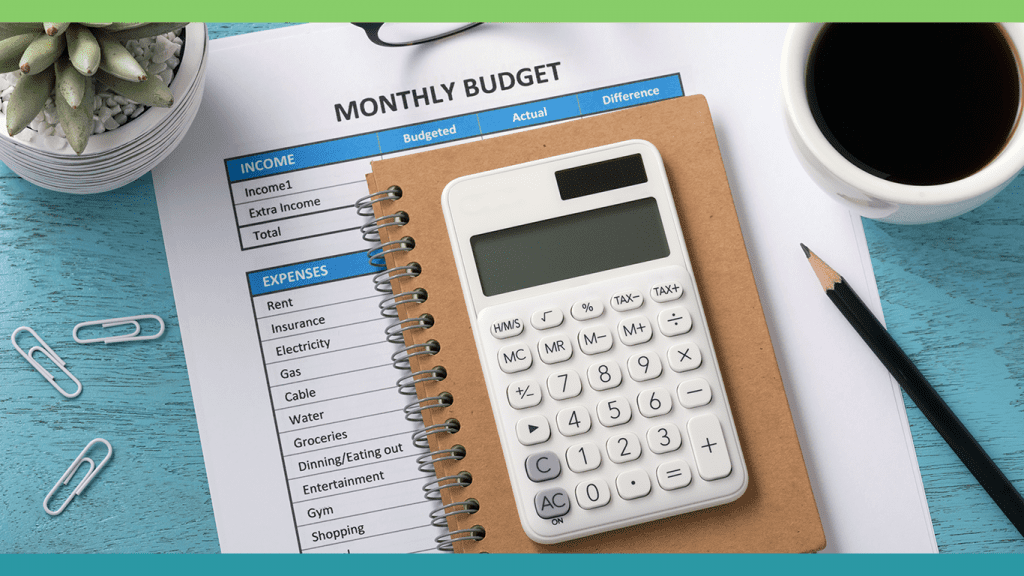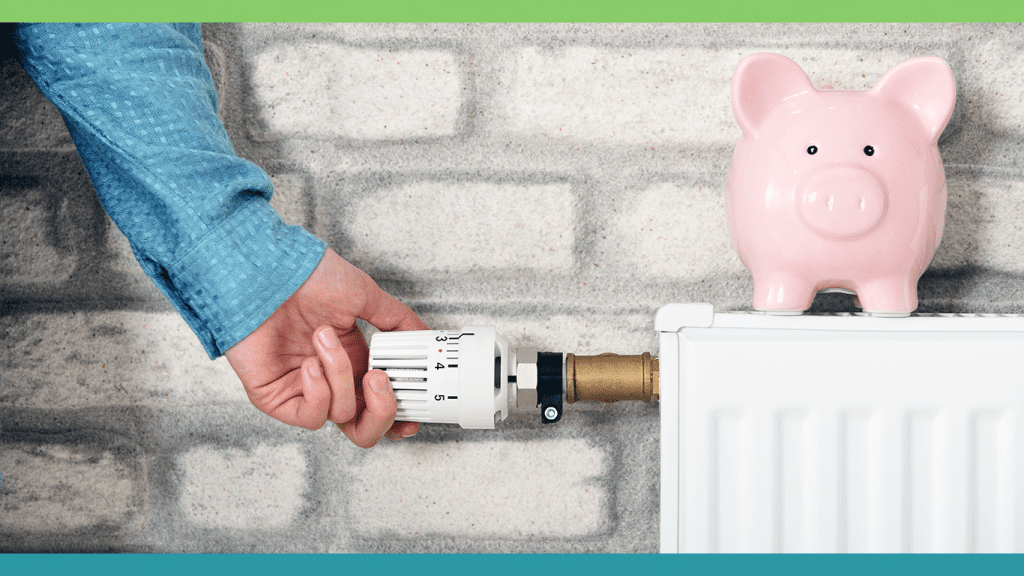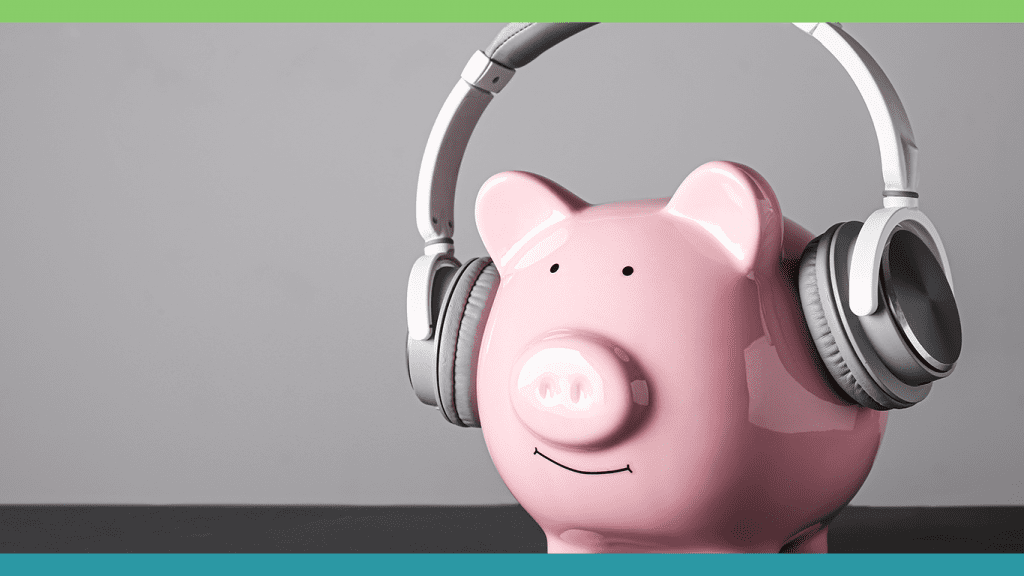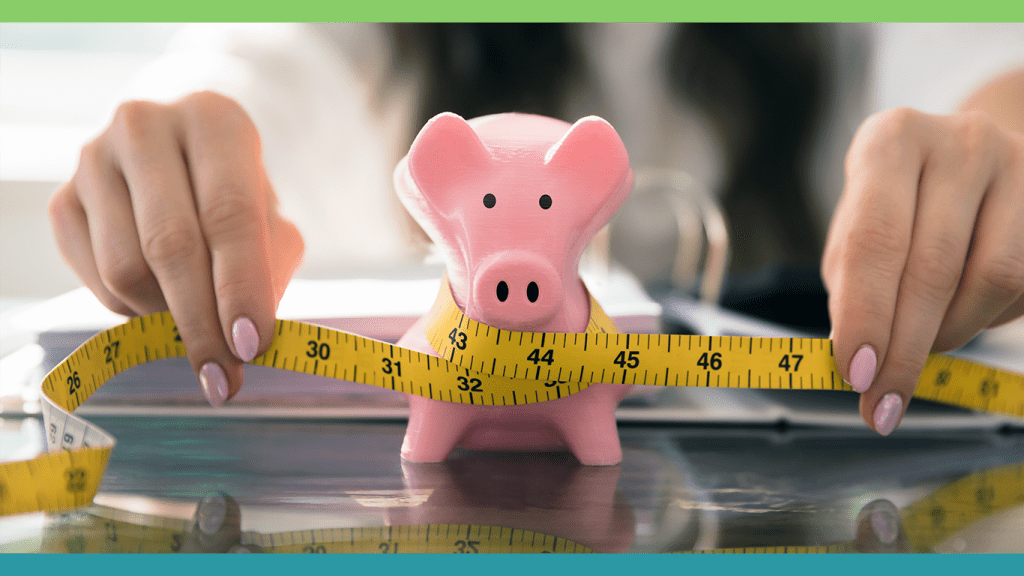We’ve all heard the saying about saving for a rainy day. But what about sunny days and holidays? Or saving up to buy something you really want? Saving money can help with these things, too.
If you’re on a low income, it might seem like there’s no hope of amassing any savings. But a little saved each month can soon add up. And simple ways to cut your monthly expenses can help you save even more.
So where do you start? How do you work out what you can afford to save? And what can you do to spend less and save more each month?
In this post we’ll give you all the answers, including 40 ways to save money on a tight budget. With our clear and easy to follow advice, you’ll be saving money in no time.
Starting with working out your income and monthly outgoings.
Create a monthly budget planner

Your monthly budget planner should take into account your monthly income and monthly outgoings.
Not all months will be the same. For example, there are months where you’ll have annual payments to make, birthdays to buy for and services to schedule. You can put these on a yearly calendar, so you can see when they’re coming up and make sure you’re prepared.
Your monthly income
Start by calculating your monthly income. This is all the money coming into your home each month and will include things like:
- Wages and work allowances
- Benefits, such as child benefit
- Child support
- Board money, from working family members who live with you
- Rent contributions, if you live in a shared house.
Your monthly outgoings
Next, calculate your monthly outgoings. This is all the money you need to spend each month and will include your:
- Household bills, such as electric, gas, water and council tax
- Rent or mortgage
- Groceries
- Mobile phones
- TV and/or broadband
- Transport costs, such as buses, trains or fuel
- Loan repayments
- Life insurance
- Pension contributions.
You also need to include any money you’re putting aside for annual payments, ongoing expenses and special events, like:
- Insurance premiums, for your home, vehicle etc.
- Road tax and MOT
- TV licence
- Clothes and shoes
- Home improvements
- Birthdays, weddings, Christmas etc.
Anything left over
When you’ve deducted your monthly outgoings from your monthly income, you can see how much you have left over. You could keep some of this for treats, like takeaways or going to the cinema, then put the rest into a savings account.
If you don’t have enough left over for your savings, keep reading for 40 ways to save money on a tight budget.
40 ways to save money on a tight budget
These 40 money-saving tips are all free or low-cost. They could help to reduce your household spending, making your income go further and increasing the amount of money you have leftover.
How to reduce your energy bills

In the UK, the average annual energy bill for a medium-sized 3-bedroom house is around £1,163 — or £97 per month. But with the warning of rising energy prices, it’s a good idea to try and bring this down wherever you can.
1. Get the best deal on your energy bills
Are you getting the best deal from your current energy provider? When your contract is due for renewal, you can shop around for the best deals using price comparison sites like Uswitch or Compare the Market*.
*There are more benefits from using Compare the Market. Keep reading to find out.
2. Turn your thermostat down
The Energy Saving Trust recommends setting your thermostat to the lowest comfortable temperature. For most people, this is between 18–21ºC. If you find this is too cool, try wearing an extra layer of clothing.
The Sleep Foundation advises reducing this further at night — to 15.6–19.4ºC. This will help you save and give you a better night’s sleep.
3. Check for draughts
Cold draughts can lower the temperature in your room. This means your heating has to work harder to keep your home warm and will be using more energy.
Check your doors and windows for cool air coming in and use draught excluders to seal any gaps.
4. Switch to energy-saving lightbulbs
If you haven’t already, switch to energy-saving LED lightbulbs. This will save an average home about £35 per year on energy bills.
The bulbs are more expensive than traditional bulbs, but they also last longer — much longer! In fact, you could run them for 12 hours a day for around 11 years before you would need to replace them.
5. Turn off lights when you’re not using them
The cost of running energy-efficient lightbulbs isn’t much. But it’s still worth getting into the habit of turning off lights as you leave a room.
According to a spokesperson from the Energy Saving Trust, turning off the lights you’re not using could save an average household around £15 a year and will prolong the life of your bulbs.
6. Avoid running appliances unnecessarily
You’ll save money on energy if you avoid running your appliances and electrics for longer than is necessary.
For example:
- Start using the oven as soon as it’s up to temperature
- Wash your clothes on the shortest possible cycle
- Time your dryer correctly to avoid overrunning it
- Avoid charging your devices overnight
- Avoid keeping fully charged devices connected to the power.
7. Use your slow cooker
Slow cookers are one of the most energy efficient ways to cook your food. A large slow cooker can cook an entire one-pot meal. It’s great for cooking cheaper cuts of meat and there’s minimal washing up afterwards.
8. Unplug any appliances you’re not using
If electrical items are plugged into the mains supply, they can still be using energy on standby. The energy used by individual items isn’t a lot, but it can add up over the whole house.
Items you can unplug could include your:
- Broadband router
- TVs and TV boxes
- Games consoles
- Computers.
9. Fully load your machines
Fully load your washing machine or dishwasher and you could save 25-30% on your energy costs compared to washing half a load.
Be careful not to overload them, though, as this can cause wear on moving parts and stop your machine from cleaning properly.
10. Wash your clothes at lower temperatures
Unless your clothes are badly stained, you can save energy by washing them at a lower temperature.
Washing your clothes at 30ºC rather than 40ºC uses 38% less energy.
And if you turn the temperature down to 20ºC, you’ll use 62% less energy.
11. Dry clothes outside
Some dryers can cost as much as £140 a year in energy costs.
By comparison, sunshine and wind cost nothing. So if you have an outside space, it makes sense to use a clothes line.
12. Keep your freezer full
Your freezer will run most efficiently when it’s full. One way to keep it filled up is to cook double portions of the meals you’re making and freeze half for another day.
13. Maintain your appliances
Keeping your appliances clean and well-maintained means they’re less likely to go wrong and more likely to last.
For the best results, always follow the manufacturer’s advice and instructions.
How to reduce your water bill
In the UK, the average annual water and sewerage bill is £396.60. That’s around £33 a month. Saving water makes sense for your budget and the planet.
Here are some tips to help you, with usage figures from water.org.uk.
14. Avoid running water unnecessarily
A running tap wastes over 6 litres per minute and that’s literally money down the drain. Remembering to turn the water off when you’re not using it can help you save.
For example:
- Turn the tap off while brushing your teeth
- Avoid leaving running taps and hosepipes unattended
- Stop the shower while soaping and shampooing
- Avoid rinsing your dishes after washing them.
15. Take showers rather than baths
A typical bath uses around 80 litres of water. A short shower uses about a third of that, so it makes sense to make the switch when you can.
16. Fix leaky taps
A dripping tap wastes at least 5,500 litres of water every year. The good news is, it’s usually easy to fix yourself, without having to call a plumber.
17. Rinse fruit and vegetables over a bowl
If you’re rinsing fruit and vegetables, do it over a bowl. When there’s enough water in the bowl, stop the tap and wash them in the bowl. You can then reuse the water in the bowl for other tasks, like watering your plants
18. Get a water butt
A water butt is a large container that sits in your garden and collects rainwater from the roof of your home. In the UK, we get a lot of free rainwater, which you can use for watering your garden or washing your car.
19. Ditch your garden hose
Your garden hose can use 1,000 litres of water every hour. Try switching to a watering can for watering your garden and use a bucket to wash your car.
How to spend less

We all have general weekly and monthly expenses to manage, like groceries, transport and non-essentials. Here’s how to spend less so you can save more.
20. If it’s broken, try fixing it
Many of the things we throw away still have life in them. If something has broken or come apart, it might be cheaper to repair it than replace it.
21. Buy second-hand
If there’s something you need, check the second-hand shops and online listings first. Charity shops have a range of good quality second-hand items including clothing, shoes, furniture, books and ornaments.
There are some amazing deals on eBay and Facebook Marketplace that offer savings compared to the cost of buying new.
22. Try the 30-day rule on impulse buying
Impulse buys always seem like a good idea at the time, but we can often regret them later. Next time you’re tempted to buy on the fly, try the 30-day rule and take 30 days to think about it.
Ask yourself, do you really need it? Can you really afford it? Will you use/wear it as much as you think?
After 30 days, many people find they’ve changed their minds and saved themselves some money.
23. Shop around for deals and best prices
We’ve all had that awful feeling when we’ve just bought something then found it cheaper elsewhere. If you’re lucky, the store might offer a price match, but you shouldn’t count on it.
To avoid any problems it’s best to shop around before you buy. There are many websites that help you compare prices and find the best deal. Here are a few to get you started:
24. Be a smarter supermarket shopper
It’s easy to overspend in the supermarket. Here are some simple tips to help you shop smarter and save:
- Sign up for a reward card and start earning points
- Avoid shopping when you’re hungry
- Plan your meals in advance
- Make a shopping list and stick to it
- Buy non-perishables in bulk when they’re on sale
- Choose refills to save money and packaging
- Check the reduced shelf for bargains
- Try cheaper supermarket own-brand products.
25. Walk or cycle wherever you can
Walking and cycling are free (if you have a bicycle) and ideal for short local journeys. Plus you also get the benefit of fresh air and exercise.
26. Buy saver tickets on public transport
Some bus and train companies offer daily or weekly saver deals. If you’re a regular passenger, this could add up to a healthy saving.
27. Consider car-sharing
Car-share schemes help workers save money on travel and reduce the number of cars on the road. You could check if your workplace operates a scheme, or set one up yourself with colleagues who live close by or with local people who travel to the same area for work.
28. Look for deals on your MOT
If your vehicle’s MOT is due, it pays to shop around. You could save up to 50% if you find yourself a good deal.
How to reduce your entertainment spend

Your entertainment spend includes all the things you do in your spare time that cost money. There are lots of ways to save here and still have fun.
29. Cancel any subscriptions or memberships you’re not using
Check your bank account or credit card for subscriptions and membership fees you might have forgotten about. If you’re no longer using them, you could stop them and save the money. Just make sure it won’t cost you to cancel.
30. Have just one TV subscription
TV subscription services can cost up to £10 each per month. If you’re paying for two or more, you might not be getting the best value. Instead, you could cut down to one subscription, get the full use out of it, then switch to a different service after a couple of months. If you choose a service you haven’t subscribed to before, you might even get a free trial.
31. Cut eating out to once a month
The cost of restaurant meals can mount up if you have them regularly. Cutting down to one meal out a month and finding a good restaurant deal could make you a healthy saving.
32. Look for restaurant deals
If you want to eat out, check these websites for cheap restaurant deals in your area. You could get up to 50% off the price of your food.
- 5pm
- Groupon
- The Fork
- Money Saving Expert
- Open Table — use the Discounted Offer filter to find deals
- TablePouncer — for last-minute deals.
33. Join the mailing lists of chain restaurants
Some chain restaurants send offers, discount codes and vouchers to their mailing list subscribers. You may also get access to an offer just for signing up.
34. Take your leftovers home
Restaurant portions can be huge. If you can’t finish your meal and have leftovers, ask your server to wrap them for you. Put them in the fridge when you get home and that will be lunch sorted for the following day.
35. Get Meerkat deals
When you compare prices at Compare the Market and sign up for a qualifying deal, you’ll get a year of Meerkat Movies and Meerkat Meals. These rewards entitle you to 2 for 1 meals and cinema tickets.
How to save money on a tight budget

When you get your monthly spending under control, you can focus on putting money away and watching your savings grow.
36. Pay off your debts
The quicker you can pay off your loans and credit cards, the less interest you’ll have to pay and the more money you’ll have to save.
37. Automate your bill payments
When you automate your bill payments, the money is taken from your account automatically. This is a good way of making sure your bills are always paid on time, so you don’t risk any late fees.
38. Open a separate savings account
It’s good to have a separate account that’s just for your savings. This will keep your savings separate from your other money so you can’t accidentally spend it.
39. Set up savings goals
Having a savings goal gives you something to aim towards. For example, if you’re saving for something in particular and you know how much it costs, you can set yourself a goal for reaching your total.
40. Take a savings-first approach to your money
When you use the savings-first approach, you save your money at the beginning of the month rather than waiting until the end.
This guarantees you’ll save your target amount every month, because you won’t have a chance to spend it.
To be doubly sure, set up an automatic transfer to move your target amount straight into your savings account when you get it.
Do you need some help with savings?
Clockwise Credit Union can show you how to save money on a low income.
We’ve helped members in Leicestershire, Rutland, Northamptonshire, Coventry and Warwickshire to manage their money and start saving for their future plans.
What we can offer
Instant access savings accounts
Life is full of surprises — and unexpected bills. That’s why our instant access savings accounts give you access to your money whenever you need it, with no penalties for withdrawals.
Choose from our Instant Access Share Account, or our PrizeSaver Account, which allows you to start saving with just £1 and gives you a chance of winning up to £5,000 each month.
Our friendly team will talk you through the options and help you find the best one for you.
Mobile phone app
With our mobile phone app, you’ll always have your money at your fingertips. You can instantly transfer money, set up savings goals and view your balance and transactions.








